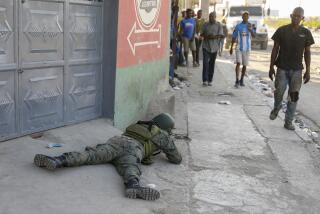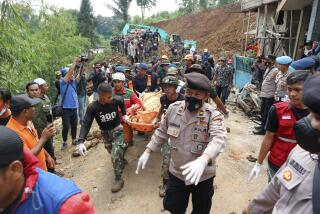Indonesian General Hints He May Accept Peace Force : E. Timor: Wiranto admits troops appear out of control. New reports of slaughter come out of the territory.
- Share via
DILI, East Timor — Indonesia’s armed forces chief, Gen. Wiranto, conceded for the first time Saturday that he might not have full control of his soldiers in East Timor, and he hinted that he might soon accept the help of international peacekeeping troops to restore order here.
But although Wiranto’s statement was the first sign of a shift by the Indonesian government, which has steadfastly refused any immediate outside help or intervention in East Timor, it remained far from clear that Indonesia is prepared to accept a peacekeeping force, despite intensifying international pressure.
As Wiranto spoke with reporters here, a U.N. spokesman, quoting refugees in the area, said today that the Indonesian army and their militia allies have attacked and slaughtered refugees in a town once considered a haven in East Timor.
The spokesman, David Wimhurst, said in Darwin, Australia, that Indonesian troops were firing on refugees in Dare, a Roman Catholic seminary town where tens of thousands of refugees have sought shelter.
Indonesia claims the territory, which it invaded in 1975, as a province, and some members of its military have joined anti-independence forces in the looting, burning and killing rampages that have driven out tens of thousands of Timorese since the vast majority voted for independence in a U.N.-supervised election Aug. 30.
At the United Nations, Secretary-General Kofi Annan reacted to Wiranto’s statement with cautious optimism, saying he hoped to confirm the change in position when he talks with Indonesian President B. J. Habibie this morning. But Indonesian Ambassador Makarim Wibisono dampened hopes for an agreement by saying Indonesia does not need a peacekeeping force at this stage.
“Such an operation may well exacerbate the situation and be counterproductive, however well-intentioned it may be,” he said.
In a formal open debate on East Timor in the Security Council on Saturday, Annan said it might well be an “international crime” that the Indonesian government allowed East Timor to descend into chaos and crisis. Altogether, 50 ambassadors spoke at the session and urged Indonesia to control the situation.
“The scale of the violence, death and destruction has been far beyond what international observers anticipated,” Annan said. “The individuals who have ordered and carried out these crimes must be held accountable.”
That probably meant Wiranto, who is in charge of keeping the peace in East Timor. On Saturday, the general came to Dili, the violence-ravaged capital, with a high-level U.N. delegation that was making another attempt to convince Indonesia to rein in anti-independence militias and allow the deployment of peacekeepers.
The general rejected charges that he wasn’t doing enough to halt the violence--25 militiamen had been arrested and 27 weapons confiscated, an aide said. But in remarks to reporters, Wiranto added that there is a strong emotional bond between his soldiers and the militias that have been terrorizing the territory’s people.
“I have checked the situation on the ground and concluded the problem is psychological containment among our soldiers,” Wiranto said. “For 24 years, they have worked hand in hand with them [the militias] as Indonesia developed East Timor.
“I can understand it is hard for them to shoot their own people who have been regarded as brothers in arms and not really as criminals,” he said. “It will take time and patience to convince the others that violence is not acceptable.”
But Indonesia may not have much time left as the international community ratchets up the pressure.
In Auckland, New Zealand, where he is attending a Pacific Rim economic summit, President Clinton today opened the way for possible U.S. participation in an international peacekeeping force for East Timor, saying that “in a limited way” American soldiers could help provide logistical and communications support for such a force. But he said no decision has been made.
“We haven’t finalized anything yet,” Clinton said, adding that he had already consulted with eight to 10 congressional leaders.
“Right now, I think the important thing is to keep the pressure up here, to try to get the Indonesians to fix the problem . . . and to ask for help, support from the United Nations,” Clinton told reporters.
The five-member Security Council delegation that came to Dili on Saturday was clearly skeptical of Wiranto’s and his subordinates’ claims that they were taking control of the situation with the help of martial law.
When Maj. Gen. Kiki Shahnakpi, the East Timor commander, showed a slide at one briefing reflecting a decline in killings, kidnappings and arsons since the declaration of martial law nearly a week ago, Jeremy Greenstock, the British ambassador to the U.N., asked, “Isn’t the lower rate of violent incidents really due to the fact that most people have fled Dili or been moved away?”
Staff members of the delegation remained divided over whether Wiranto himself has condoned--and even ordered--the militia violence. The turmoil has turned 200,000 people, or one of every four East Timorese, into refugees and resulted in the deaths of more than 20,000 people, the Catholic Fund for Overseas Development says.
The Dili that the U.N. delegation toured under the guard of four truckloads of Indonesian soldiers was devastated and eerily quiet. The streets were largely deserted; most buildings had been looted, burned and gutted; and fires still smoldered, sending plumes of dark smoke into the crystal-blue skies. A few militiamen peered out from alleyways but kept a low profile.
Along the trash-littered roads, small groups of refugees sat on curbs, sullen and blank-eyed, as if they hoped that some vehicle would show up to take them to safety. Most had mattresses, sacks of rice and a few belongings salvaged from their burned-down homes.
“We’re here not to negotiate but to explore what the government can do to improve security and humanitarian conditions, which are getting worse,” said Namibian Ambassador Martin Adjaba, head of the delegation. It will report its findings to Annan this week in New York.
“Civilians are getting killed, chased away from their homes. They have no food. They are in the jungles, and no one knows what their fate is,” Adjaba said.
The few journalists accompanying the delegation to Dili on the daylong trip had been asked by Greenstock if they were willing to travel with the understanding that their lives would be at risk “because security is being provided by TNI [the Indonesian military], which we cannot trust.”
But this time, TNI was taking no chances. Hundreds of troops lined the roads on which the U.N. convoy traveled, commanders were friendly and helpful, and the besieged U.N. compound in the capital, guarded by scores of soldiers with automatic weapons at the ready, appeared to be as safe as anyplace on Earth. Not a shot was heard all day.
“It’s interesting how things can be controlled and changed from one day to the next,” said Ian Martin, head of the U.N. East Timor mission, referring to beliefs that the military can turn the militia violence on and off at will.
It was in his discussions with the U.N. officials that Wiranto appeared to soften his opposition on a peacekeeping force, indicating that perhaps the world community’s pressure on Indonesia was having some effect on official thinking.
Lamb reported from Dili and Farley from the United Nations. Times staff writer Edwin Chen in Auckland contributed to this report.
More to Read
Sign up for Essential California
The most important California stories and recommendations in your inbox every morning.
You may occasionally receive promotional content from the Los Angeles Times.










